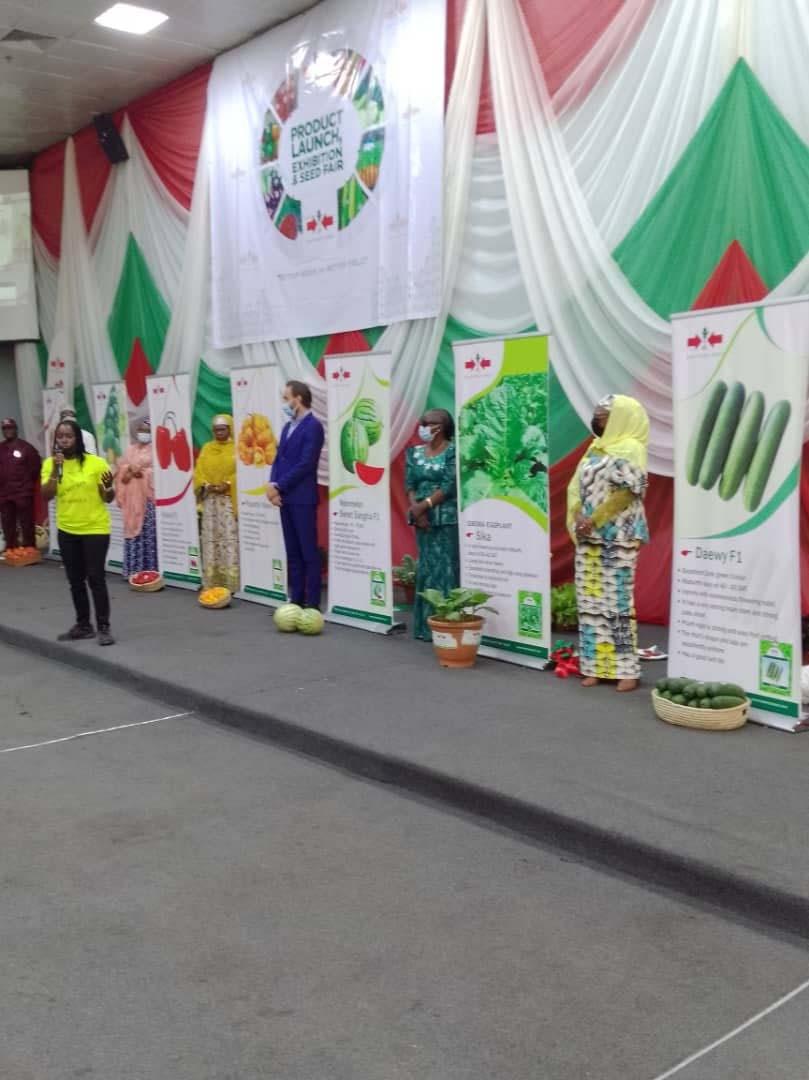AN agribusiness giant, EAST WEST SEED Nigeria, Friday, launched vegetable products to boost farmers’ productivity with the new innovative seeds for high yields.
The launch was made in Abuja, with farmers, academia, regulatory agencies, breeders, media, and others present at the 1st ‘Product Launch, Exhibition & Seed Fair’ organised by EAST WEST SEED Nigeria.
The products launched by EAST WEST SEED Nigeria include Tomato Diva F1; Papa Gymbia F1; Hot Pepper Spicy F1; Hot Pepper Piquante Yellow F1; Water Melon Sweet Sangria F1; Gboma Eggplant (African Leafy Vegetables) sika; and Cucumber Daewy F1.
Speaking on the essence of the launching, Business Development Manager, EAST WEST SEED Nigeria, Hadiza Yaro, explained that in order to surmount challenges plaguing agricultural activities including climate change, pests, diseases and others, the company deemed it fit to come up new innovative products to fortify farmers, and not to depend on old varieties, and also for the company to remain competitive because things are changing, hence the company is to change with the time.
Yaro said: “Today is hardwork of about 15 years because is not easy to come up with one hybrid. If you check the global rating on vegetable companies in the world one of our strengths in EAST WEST SEED is we are one of those companies that keep smallholder farmers to mind, and we keep on improving on what we have.
“If you see a variety is almost like perfect meaning farmers, consumers and even the company the people are breeding are happy about it. So today’s event is to offer farmers new innovative that would increase their yield and also bring to them new portfolio that never existed before like the Hot Pepper Piquante Yellow F1 we saw today like the Gboma Eggplant which is an African little vegetable and we also want to have that local content that is why we are having this event.”
She further stated that “About 10 per cent of what the company gets as revenue is used for research and development. All these seeds here are all from our farm, EAST WEST SEED doing it and are all from Kaduna.
“So our breeders are always researching to see what are the trends in the market, what are the complaints from farmers, what can they do to improve the existing varieties so that farmers can make more yields so to get good income.
“This event is to showcase the invisible work of our breeders because you discover breeders working for may be 30 years and yet they don’t have one single variety launched into the market.
“We are rated number one in terms of reaching out to farmers. That is why I made reference to global seed index, and recently we were applauded for 2016 until 2021 as number one vegetable leaders in South and South-East Asia. Also EAST WEST SEED was ranked number three in Central and West Africa.
“We have army of agronomists that is busy working with farmers in the field, and again beyond this we have the knowledge transfer based in Kaduna and Kano where we collaborate with Ahmadu Bello University, Ministry of Agriculture, and others.”
However, she pointed out that “Penetrating the market is a relative term and really a difficult one for us because we have competitors out there, and the greatest competitor for us is not the big seed companies you hear about is the smallholder farmers because their mentality have not changed from what they used to do meaning every farmer wants to extract the seeds because they feel is cheap but I can tell you cheap can be expensive meaning you are losing your yield year in year out if you continue to want use the seed.”
Meanwhile, speaking with journalists on the sideline, Director General, Nigeria Agribusiness Group, NABG, Manzo Maigari, lamented poor hygiene as being responsible for Nigerian vegetable not meeting international export standards.
According to Maigari, a 2017 survey indicated that ShopRite and retail supermarkets were importing vegetables and fruits into Nigeria to the tune of about $37 million, which at that time translated to N1.2 billion per day.
“The question is why would they do that? the answer is simple, the quality of our vegetables does not meet their standard, if you go to Shoprite today and you’re buying vegetables, or you end up with ecoli, or typhoid, you can sue Shoprite, but they want to buy vegetables that they’re not sure of the quality, hygiene and sanitation.
“And I will give you a little example. A typical local farmer farms his field, he defecates just around the farm, he urinates there, and you know that feces and urine carry a lot of bacteria.
“Sometimes most clean themselves up, they do not wash their hands with water so they just go back to the farm so they carry back the pathogens into the farm and then the vegetables or the produce gets infested.
“So it is transported up to the point of consumption. So that is one of the major problems why our own locally produced vegetables cannot find a market in those spaces. Because nobody trusts our hygiene or vegetables or sanitation is not something that changes our data”, he stated.
Although, according to him Shoprite is currently working with local farmers to improve their hygiene in the process of producing consumable crops, but mentioned that exporters of agricultural produce are facing challenges of high taxes and tariffs, difficulty in accessing forex, unnecessary bureaucracy in the process of exporting agricultural produce, and other bottlenecks.


